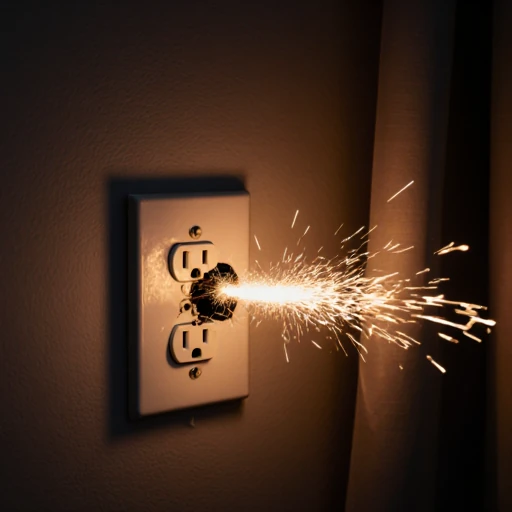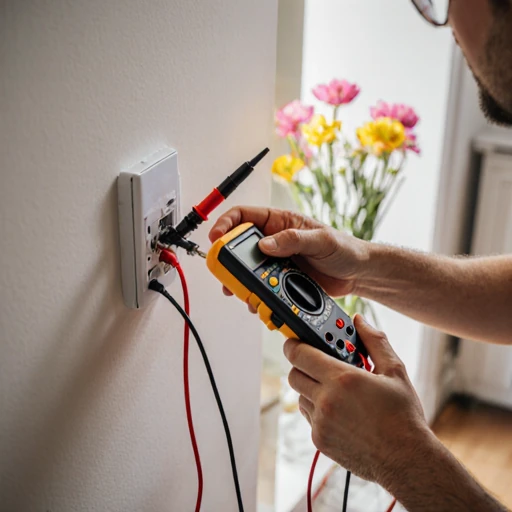Imagine this: You’re settling in for a cozy evening in your Cape Town home, the spring breeze whispering through the windows, and suddenly, the lights flicker out in just one room. The rest of the house hums along fine, but that bedroom or kitchen is plunged into darkness. Frustrating, right? As the first blooms of spring appear across the Mother City, many homeowners face this puzzling issue. It’s not just an inconvenience, it’s a signal that something’s amiss in your electrical system. In this article, we’ll dive into the world of electrical fault finding, uncovering why power outages target specific rooms and sharing practical tips tailored for Cape Town’s unique springtime conditions.
As a team passionate about keeping homes safe and powered, we’ve seen our fair share of these mysteries at ElectroGem. Spring in Cape Town brings warmer days, but it also stirs up remnants of winter’s dampness, which can wreak havoc on wiring. Whether you’re in a historic Victorian in Gardens or a modern flat in Sea Point, understanding electrical fault finding can save you time, money, and headaches. Let’s break it down step by step, starting with pinpointing the problem.
Unmasking the Mystery of Single-Room Blackouts
The challenge starts innocently enough. You flip a switch, and nothing happens in one area, while the adjacent room glows brightly. This isn’t a city-wide loadshedding event, it’s localized, often baffling homeowners who assume it’s a simple bulb issue. But dig deeper, and you’ll find electrical fault finding reveals common culprits unique to Cape Town’s environment.
First, consider faulty wiring or loose connections. In older homes, especially those built before the 1990s, wiring can degrade over time. Cape Town’s coastal humidity, amplified in spring as temperatures rise and moisture lingers from winter rains, accelerates corrosion. A wire that’s come loose in a junction box or outlet might only affect one circuit, leading to power loss in a single room.
Another frequent offender is an overloaded circuit. As spring encourages more outdoor activities, you might plug in extra fans, heaters winding down from winter, or even string lights for braai evenings. If that room’s circuit can’t handle the load, it trips internally without affecting the main board. Electrical fault finding often points to this, especially in homes where extensions have been added haphazardly.
Then there’s the sneaky issue of damaged cables. Rodents, common in Cape Town’s suburban areas like Rondebosch or Constantia, might chew through wires during the colder months, only for the damage to manifest as spring cleaning reveals hidden nests. Or, perhaps a recent renovation nicked a cable behind the wall. These faults isolate power to one zone, making it seem like a targeted outage.
GFCI or RCD trips are also culprits. In bathrooms or kitchens, these safety devices protect against shocks but can trip due to moisture ingress, a big springtime problem when windows are opened more, letting in humid air from Table Bay. Finally, appliance malfunctions, like a faulty fridge or lamp short-circuiting, can pull power from just that outlet’s line.
These issues aren’t rare. In fact, with Cape Town’s mix of old and new architecture, plus seasonal weather shifts, single-room outages spike in spring. Homeowners often overlook them at first, thinking it’s temporary, but ignoring electrical fault finding can lead to bigger troubles.

The Hidden Dangers of Ignoring the Outage
Now, let’s talk about why brushing off this problem isn’t wise. Leaving a single-room power outage unsolved isn’t just annoying, it escalates risks that could hit your wallet, safety, and peace of mind.
Financially, the costs add up quickly. An unresolved fault might cause appliances to overwork or fail prematurely. Imagine your home office in darkness, forcing you to relocate work setups, or a kitchen outage spoiling food in the fridge. In Cape Town, where electricity tariffs are climbing, inefficient systems from hidden faults can inflate bills by 20-30% as power leaks or circuits struggle. Prolonging the issue means potential repair bills balloon from a simple fix to rewiring an entire section, especially if corrosion spreads in the spring humidity.

Safety is the bigger concern. Electrical fault finding experts know that loose wires or damaged cables can spark fires. Cape Town’s fire department reports increased electrical-related incidents in transitional seasons like spring, when damp conditions meet rising temperatures. A fault left unchecked could lead to arcing, where electricity jumps gaps, generating heat up to 3,500 degrees Celsius, enough to ignite nearby materials like curtains or wooden frames common in heritage homes.
Health risks lurk too. Shocks from faulty outlets aren’t uncommon, particularly if you’re tinkering without proper knowledge. For families with kids or elderly members, a dark room increases trip hazards, especially in spring when longer days encourage more activity but evenings still dim early. Businesses in residential conversions, like home-based salons in Muizenberg, face downtime, losing clients and revenue.
Environmentally, unresolved faults waste energy, clashing with Cape Town’s push for sustainability amid water and power crises. And let’s not forget the stress: Constantly resetting breakers or using extension cords from other rooms disrupts daily life, turning your sanctuary into a frustration zone. In a city as vibrant as ours, who wants that when spring calls for beach days and mountain hikes?
The urgency is real. What starts as a minor glitch can cascade into emergencies, emphasizing why prompt electrical fault finding is essential.
Step-by-Step Electrical Fault Finding Tips
Fear not, Cape Town homeowners, tackling this doesn’t require a degree in engineering. Here’s a clear, actionable approach to electrical fault finding, designed for spring’s specific challenges. Remember, safety first: If you’re unsure, call a professional, but these steps can help diagnose and prevent escalation.
Step 1: Isolate the Issue
Start by checking if the outage is truly room-specific. Plug a working appliance into outlets in the affected area. If none work, note which ones are dead. In spring, test for moisture by feeling walls for dampness, common after winter rains in areas like the Atlantic Seaboard.
Step 2: Inspect the Basics
Look at your electrical distribution board. Even if the main breaker hasn’t tripped, a sub-circuit might have. Reset any tripped switches, but if it happens again, that’s a clue. For Cape Town homes, spring pollen and dust can clog boards, so gently clean with a dry cloth, never water.
Step 3: Test Appliances and Outlets
Unplug everything in the room and plug items back one by one. A faulty device, like a spring-cleaned vacuum with a frayed cord, could be the trigger. Use a voltage tester (available at local hardware stores) to check outlets for power. If it’s zero volts, the fault is upstream.
Step 4: Trace the Circuit
Understand your home’s wiring map. In many Cape Town setups, rooms share circuits, but singles might branch off. Follow from the outlet back to the board, checking for visible damage like chewed wires or burn marks. Spring’s warmer weather makes it ideal for this, as you can open windows without freezing.
Step 5: Address Common Spring Factors
Humidity is key here. Use a dehumidifier in damp rooms to prevent condensation on wires. Seal gaps around outlets to block moist air. For rodent damage, inspect attics and use natural repellents like peppermint oil, safe for Cape Town’s eco-conscious vibe.
Step 6: Advanced Checks
If basics fail, use a multimeter for continuity tests on wires, but only if you’re comfortable. Look for GFCI outlets, reset them by pressing the button. In spring, with more rain possible, ensure outdoor influences like tree branches aren’t rubbing lines.
Step 7: Prevent Future Issues
Install surge protectors, upgrade to modern breakers, and schedule annual inspections. In Cape Town, complying with SANS 10142 standards via a Certificate of Compliance (COC) is crucial, especially for selling or insuring your home.
These steps empower you to handle electrical fault finding confidently, turning a spring nuisance into a quick win.


How Expert Help Fits Seamlessly
While these tips provide a solid start, sometimes the fault runs deeper, requiring tools and expertise beyond the average toolkit. That’s where a qualified team shines, offering thorough electrical fault finding that uncovers hidden issues without guesswork. At ElectroGem, our electricians are versed in Cape Town’s quirks, from salty air corrosion to seasonal surges, ensuring fixes that last.
We integrate seamlessly into your solution by providing on-site diagnostics, using advanced equipment like thermal imaging to spot hot spots invisible to the eye. This not only resolves the immediate outage but enhances overall efficiency, aligning with your home’s needs this spring. Think of it as partnering with locals who know the lay of the land, making your space safer and more reliable.
Real stories from clients highlight this: A family in Claremont discovered a springtime fault from winter storm damage, fixed swiftly to restore their home office. Another in Camps Bay avoided a potential fire through proactive checks. It’s about blending DIY knowledge with professional precision for peace of mind.
Spring into Action for a Powered Home
As spring unfolds in Cape Town, don’t let a single-room blackout dim your season. By understanding the problem, recognizing the risks, following a structured electrical fault finding approach, and knowing when to seek expert input, you’re set for success. Remember, a well-maintained electrical system isn’t just functional, it’s the backbone of a happy home.
If you’ve encountered this issue, share your story in the comments, we’d love to hear how you tackled it. For more tips on keeping your Cape Town home humming, explore our blog or reach out. Here’s to brighter springs ahead!
Learn safe electrical fault finding steps for your distribution board during Cape Town’s winter-to-spring shift to avoid costly faults – read our recent article here…
